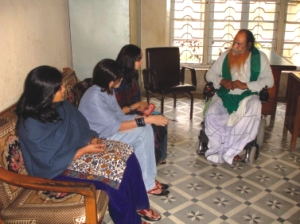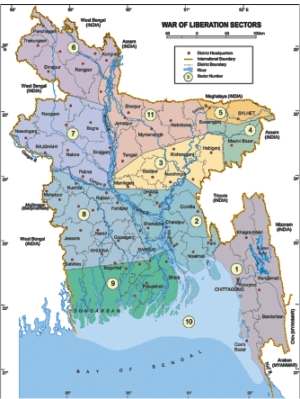Meeting a war veteran
Nudrat Lohani & Syeda Sabita Amin
As victory day draws closer, the whole country gears up for the proudest day in our history. The red and green appears everywhere and it suddenly becomes the “in” thing for students to be wearing them around.
We, a group of students from BRAC University, decided to celebrate 16th December in a different way. We decided to pay respect to not only the martyrs but also the heroes who live to tell the tale.
Somehow these heroes are forgotten, left behind by the fast moving society where everyone's busy about today, a society where you are only remembered in death. These heroes were just as brave, just as patriotic and fought just as hard to free our country, yet we manage to forget them when we pay respect to our martyrs. We manage to keep them in forgotten dark corners of our lives, locked away from our pride because they are not the epitome of brave soldiers, the image we want to hold on to. They are injured veterans who are shunned from society for their incapability to move along with the pace of our “run for profit” society.
 We know the names of our martyrs by heart, yet we do not know of a Mr. Gulam Mostafa, a freedom fighter injured on 6th December 1971, fighting against the country he had swore to serve. He had pledged his life as a response to Bangabandhu Sheikh Mujibur Rahman's, “Eibarer Shongram, Shadhinotar Shongram” call for freedom. He had revolted against his superior officials in the Pakistan army and went on to fight for his country. He is a proud patriot who gave his legs for our country and would have given his life just as gladly.
We know the names of our martyrs by heart, yet we do not know of a Mr. Gulam Mostafa, a freedom fighter injured on 6th December 1971, fighting against the country he had swore to serve. He had pledged his life as a response to Bangabandhu Sheikh Mujibur Rahman's, “Eibarer Shongram, Shadhinotar Shongram” call for freedom. He had revolted against his superior officials in the Pakistan army and went on to fight for his country. He is a proud patriot who gave his legs for our country and would have given his life just as gladly.
We do not know of the 400 homes around the country that house injured persons and their families. We never wonder about the injured soldiers from the 1971 war who cannot keep pace with our society on account of the sacrifice they made for us.
To pay our overdue respect, we visited one such home and sat down to hear tells of the war from Mr. Gulam Mostafa. The home was dilapidated and did not carry the aura of pride. We had imagined the war heroes of our county living proud lives and were greatly disappointed when we entered the court yard of a tired building housing two veterans in wheel chairs and their families. These homes are maintained by the Muktijodha Kalyan Trust and financed mostly by the government. A fund of 15 crore is assigned to them every year, which is not much if you consider the fact that 400 homes and hundreds and thousands of veterans are living off it. On average, each veteran receives 3000 taka per month from the fund. Understandably, this is not enough to sustain an entire family. The veterans along with some well wishers run certain manufacturing industries, the profit from which fills in the gaps from the funds provided by the government.
Talking to the “khetab” recipient and another veteran present in the home at that time, Md. Yunus Chowdhury, we understood the present situation of these freedom fighters and got to know about the steps the government has taken so far to honor them. Mr. Gulam Mostafa uses an advanced model of a wheel chair with a remote control panel on the arm. He enthusiastically told us how he feels a little freer now and how it is easier for him to move around. He recollected his younger years and talked about the war. It was amazing to hear it firsthand from someone who had been at the front line. Mr. Gulam Mostafa had joined the Pakistani army at the age of 18 in 1968. He was inspired by the famous speech of Bongobondhu and retaliated against his senior officers along with other Bengali soldiers. He proudly recollected how he had joined the second East Bengal Regiment and had fought for his country. He was injured on 6th December 1971 and was sent to India for treatment.
He has been confined in a wheel chair ever since. He mentioned how the Muktijudho Kalyan Trust sponsors all necessary treatment. The government provided him the new wheel chair last year.
Mr. Gulam Mostafa has received two khetabs (awards), one as Bir Bikrom and the other as Bir Protik. We learned that there are four categories of khetabs awarded to freedom fighters. The foremost is Bir shreshtho and was given to only seven freedom fighters.
The second in line is Bir Protik and was given to sixty-eight. Bir Bikrom was given to 174 other veterans along with Mr. Gulam Mostafa. These awards are classified on the basis of the sacrifices made by the soldiers and their contribution to the war.
Despite being the recipients of such prestigious awards, our forgotten heroes live their lives on meager funds. Their homes are dilapidated premises. Although the Muktijudho Kalyan Trust attempts to assist the government in providing for them, much remains to be desired.
 The only days these veterans are recognized for their immense contribution to our nation are on 26th March and 16th December. The trust arranges transportation for them all to visit the Smriti Shoudho, after which they hold a milad mahfil to commemorate the sacrifices of their friends and associates. They are also called at the Bongobhaban to receive the respect they have rightfully earned.
The only days these veterans are recognized for their immense contribution to our nation are on 26th March and 16th December. The trust arranges transportation for them all to visit the Smriti Shoudho, after which they hold a milad mahfil to commemorate the sacrifices of their friends and associates. They are also called at the Bongobhaban to receive the respect they have rightfully earned.
There are many like Mr. Gulam Mostafa. There are at least four such homes and complexes in Dhaka city alone that house as many as fifty injured veterans each. There are three such homes along the college gate line in Mohammadpur. Almost thirty veterans live in these homes with their families. These homes are maintained jointly by the Trust and the government.
As our time there came to end, we left with a heavy heart. For students like us, it is sometimes hard to relate to the war, a war we never witnessed. We see the war through the eyes of our grandparents who were the innocent victims of the oppression of the Pakistani army. Some fortunate students amidst us have freedom fighters in their families who live to tell the tales of the war through the eyes of a soldier who fought to bring our freedom to us. It is so much more vivid when you talk to personalities like Gulam Mostafa. He brings alive the war, the pride and respect that propelled us into the war. Talking to him, you can picture the war. You relate to the intense patriotism that drives people to kill and even die for their country. You almost feel the bravery and courage they harbored to fight for something they truly believed in. His stories make you wish you were born twenty years earlier would be able to take pride in your country, to be born in a time where leaders fight for their people's freedom and not only for power. A time where the mass and the leaders came together to fight a common evil. A time unimaginable to a lot of us.
Mr. Mustafa also expressed his disappointment about the current situation of the country. Although the present condition is not very pleasant, he is very hopeful. When asked if he regrets sacrificing for an outcome like today, he sounds a resounding no. He believes he would do it all over again if it meant freedom for his nation.
I will leave you with an attempt at a pledge. Let us all pledge to recognize our strengths and our heroes. Let us work our “profit-motivated” minds and create an environment where the experiences of these veterans are spread and shared throughout the strata of our societies. Let us give our societies knowledge of our heritage so as to keep the feet of our next generation firmly on the ground, where they are closer to their roots.
Copyright
(R) thedailystar.net 2006
